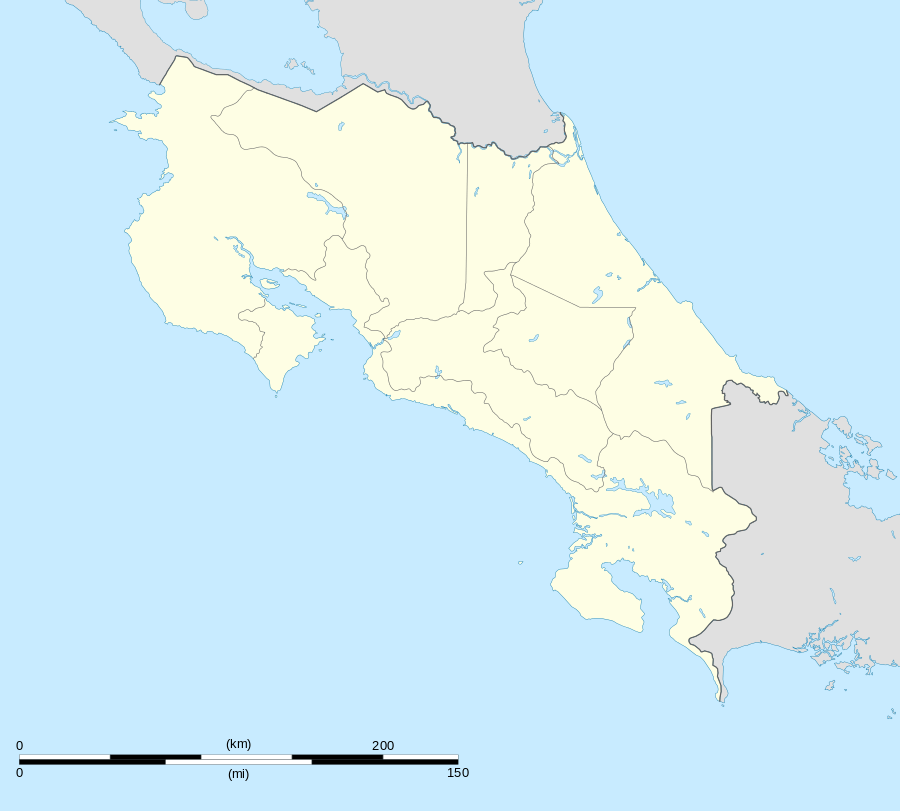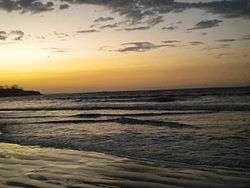Tamarindo, Costa Rica
| Tamarindo | |
|---|---|
| District and Town | |
|
The coastline in Tamarindo | |
 Tamarindo Location in Costa Rica | |
| Coordinates: CR 10°17′57″N 85°50′24″W / 10.29917°N 85.84000°WCoordinates: CR 10°17′57″N 85°50′24″W / 10.29917°N 85.84000°W | |
| Country |
|
| Province | Guanacaste |
| Area | |
| • Total | 123.53 km2 (47.70 sq mi) |
| Population (June 2013) | |
| • Total | 6,869 |
| Time zone | Costa Rica Standard Time (UTC-6) |
Tamarindo is a town and distrito located on the Nicoya Peninsula on the Northern Pacific coast of Costa Rica in the Province of Guanacaste. The district has a population of 6,869,[1] although the town itself is about 500. It can swell to 5,000 people or more during the tourist season and during special holidays. The main attractions are surfing and eco-tourism.
Towns belonging to the district besides Tamarindo are Villarreal, Santa Rosa, Garita Nueva, Hernández and San José de Pinilla.[2]
Tourism
Beaches
Playa Tamarindo is a long, rocky beach, with excellent waves near the mouth of the estuary. Currents can be strong, especially on a falling tide. Tamarindo has two main breaks for advanced surfers: Pico Pequeño a rocky point in front of the Hotel Tamarindo Diriá[3] and the excellent river mouth break across from Cabinas Tsunami called El Estero. The rest of the beach breaks are perfect for learning. The biggest waves can get up to 12 feet, although only during November and December.
Playa Grande beach is also where the Leatherback Turtle comes to lay its eggs. The leatherbacks take over the beach from November to April, digging their nests up to one meter deep, lay their eggs and cover the pit with sand, and return once again to the sea. After 60 to 90 days, the hatchlings emerge and immediately make their way to the water.
There is no road access from the town of Tamarindo to Playa Grande, as the two are separated by the Tamarindo River. However, there are small boats waiting to ferry people across the river at a modest fee. You can walk from the center of Tamarindo to the edge of the river along the wide beach.
There are other eco-friendly activities including watching turtles during their nesting season at night, diving, snorkeling, body surfing, zip-lining, estuary trips, horseback riding and fishing. During the December to April period when the water turbidity is low, fishing may be done from the shore.
The beaches in the area are generally clean and recent efforts by the government and local business organizations are proving themselves. However, the area has become a boon to developers who have cut corners and not installed proper infrastructure including black water treatment. While the beach has not regained its Blue Flag Status,[4] in September 2008, it did get a clean bill of health from the Costa Rican Government.[5] The town is trying to regain its Blue Flag Status.[6]
What To Do
ATV Tours - Combo Tours - Estuary Safari - Horseback Riding - Kayak Tours - Massages - White Water Rafting class or Tubing - Rincon de la Vieja Tours - Scuba Diving - Shuttles & Transfers - Snorkeling - Spa & Beauty - Sport Fishing - Sailing - Sunset Sailing - Surfing Lessons - Tennis Classes - Turtle Nesting Tours - Zip Line / Canopy Tours [7]
Transportation
Tamarindo is the most accessible location along the northern Pacific coast of Costa Rica with an airstrip. Scheduled daily bus service to and from San José, as well as surrounding communities, is available. There is also a paved highway from San José. The average driving time from San Jose to Tamarindo is 5 to 6 hours depending on traffic.

Liberia to Tamarindo
The average driving time from the Liberia international airport to Tamarindo is about an hour along route 21 through Palmira, Filedelfia, and Belen, and then on route 155 through Huacas. This route is on paved roads all the way, but just one lane in each direction. However, just as you reach the small town of Villareal, there is a busy 3-way intersection with route 152. It has no traffic lights or stop signs in any direction. Nonetheless, the drivers tend to be fairly polite, as elsewhere in Guanacaste, and mostly wait their turn. However, it is still wise to be careful, as motorcycles, bicycles, and pedestrians will often go right through the intersection without stopping, or even slowing down.
Route 152 into Tamarindo has a steep hill with a blind curve, so additional care is needed, both entering and leaving Tamarindo. There are also many shops along this route, so it is common for cars to appear without warning. The last turn into town, just as the ocean appears, has a tall cliff on the left, so it also has a limited view of oncoming traffic. At that point, the road gets narrower, as you pass the police station on the right. There are often cars and trucks parked on both sides of the road, sometimes leaving only a single lane for vehicles in both directions. As with the 3-way intersection, drivers are usually courteous, and rarely honk their horns. This can be a surprise to drivers from more populous countries, such as the USA.
Villareal
The small nearby town of Villareal has a school and a soccer field, plus a few restaurants and one small grocery store.
Langosta
Just east of the center of Tamarindo, there is a 3-way intersection. To the left is a road that leads to the largest bank in town. To the right is a road that leads to Langosta. That road circles around, and returns to the road back to Tamarindo.
Shopping and Services
Attorneys
A branch office of the regional law firm Expertis Legal is located in Tamarindo center.
Supermarkets
There are 5 supermarkets in the area.
- 2 small ones in Tamarindo
- Super 2001 (on main road near intersection)
- SuperCompro (smaller but air conditioned)
- Automercado, very upscale and air-conditioned, on the road into Tamarindo
- MegaSuper, large modern air-conditioned one on the road to Huacas
- SuperCompro, is larger and an older supermarket in Huacas
Farmers Markets
There is a fair-sized farmers market between the beginning of the road to Langosta every Saturday morning, which has a variety of items for sale, not just food. You will usually find at least a few dozen vendors there. There is also a smaller farmers market in Villareal, at the corner of the soccer field, every Friday morning, but it only has fruits and vegetables.
Banks
There are 3 banks in Tamarindo.
- main one on the road from the center of town mentioned above, has parking and 2 ATMs, one set lower presumably for a person in a wheelchair
- another in small plaza near the center of town, there are some ATMs in that plaza as well
- another one in Plaza Conchal COmmercial Center, below Expertis Law firm.
- there is also an ATM in the supermarket in Huacas
Hardware
There is only one place to buy hardware in the area. It located on the road into Tamarindo. They also make keys.
Surf Shops
There are several shops in Tamarindo that sell and rent surf boards. They also sell related equipment and clothing.
Hotels
There are 22 hotels in Tamarindo. All of which range from small, 4 room hotels to large 300 room hotels. Similar to the town's population each hotel is unique and different, and run by one of the many nationalities that comprise the residents. From German, to American, to Swiss, to Argentinian, to French, to Canadian, you will find all kinds of establishments here. [8]
See also
- Tourism in Costa Rica
- Country Day School, local school
References
- ↑ Estadísticas Vitales 2013 - INEC
- ↑ "Tamarindo". Retrieved 2015-03-28.
- ↑ Hotel Tamarindo Diria Beach Resort
- ↑ http://www.blueflag.org/
- ↑ http://thebeachtimes.com/article.php?id=2&at=2320
- ↑ Tamarindo News
- ↑ http://www.tamarindoactive.com/
- ↑ http://www.tamarindovistavillas.com/contact-us-and-about-us/tamarindo-information/
External links
| Wikimedia Commons has media related to Tamarindo. |
| Wikivoyage has a travel guide for Tamarindo. |
- Business Directory - Tamarindo Beach Costa Rica
- Information about surfing conditions in Tamarindo
- Tamarindo Directory
- Tamarindo Lawyers and Attorneys
- Tours and Activities in Tamarindo
